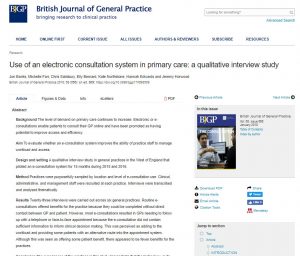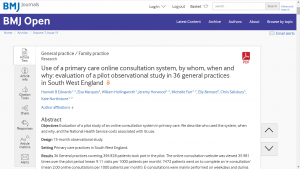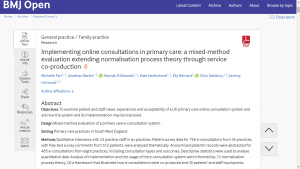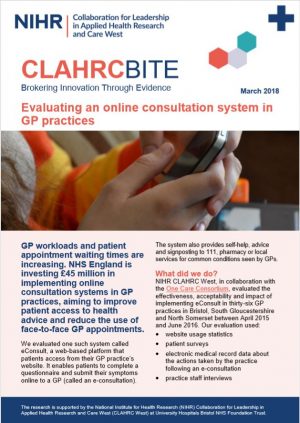Evaluating an online consultation system in GP practices
GP workload has increased by 16 per cent between 2007 and 2014, putting pressure on UK primary care services. GP practices have struggled to meet this challenge, and two thirds of GPs report unmanageable workloads. Difficulties accessing appointments have become a source of patient dissatisfaction.
Online consultations are potentially a way to improve patient access and to reduce GPs’ workload from face-to-face consultations. NHS England has promised a £45 million fund to help GP practices adopt online consultation systems. However, the evidence on the use and effectiveness of online consultations is limited.
One online consultation system is eConsult, a platform that patients access via their GP practice website. Patients who want help for a specific condition are given options to access self-help information, learn about pharmacy treatments or contact NHS 111. Patients can also submit their symptoms to a GP electronically through their practice website, creating an ‘e-consultation’. Any urgent symptoms identified during the eConsult process will immediately signpost the patient to their practice, emergency services or NHS 111.
Project aims
NIHR CLAHRC West, in collaboration with the One Care Consortium, evaluated the effectiveness, acceptability and impact of implementing eConsult, in local GP practices.
What we did
Thirty-six GP practices across Bristol, South Gloucestershire and North Somerset piloted the eConsult platform between April 2015 and June 2016.
Data was collected from:
- website usage statistics
- patient survey data
- health care resource use data from patients’ electronic medical records
- interviews with practice staff (GPs, nurses, practice managers, admin, reception and IT staff)
We summarised the number and types of patients using the online platform, when they accessed it and what they were accessing it for. We also examined the views and experiences of patients and practice staff who used the system.
What we found and what this means
A minority of patients using the system clicked through to self-help and signposting information, while 21 per cent of patients submitted their symptoms to a GP (an e-consultation).
Across the participating practices patient use of the system was low during the pilot. Patients submitted most e-consultations on weekdays and during normal working hours. Most patients said they valued the eConsult system.
Practices were often motivated to use the system because it offered the potential to reduce face-to-face contacts and free up GP time, as well as improving access for patients. However, GPs highlighted the challenges of remote consultations which lack the facility for real time interactions with patients.
While the system did save some patients having to see their GP, the majority of e-consultations resulted in either a face-to-face consultation or a telephone call from a GP.
GPs reported e-consultations worked best for simple and routine enquiries that they could respond to without the need for a face-to-face or telephone follow up.
When symptoms were complex or new, clinicians often felt it was best to arrange a face-to-face consultation. Practice staff felt these cases were using more GP time than if there had just been a usual face-to-face appointment in the first place. Lack of integration between the online consultation system and GPs’ existing IT systems also created challenges which could duplicate staff workload and lead to communication difficulties.
Online consultations were not an immediate solution for efficiency savings, but could improve access for some patients. Improvements are needed to e-consultation platforms to enhance integration with existing IT systems. Better guidance is also needed for patients on how to use the system and for practices on how to implement it.
Watch the video abstract
Papers

Use of an electronic consultation system in primary care: a qualitative interview study
Read the paper
Use of a primary care online consultation system, by whom, when and why: evaluation of a pilot observational study in 36 general practices in South West England
Read the paper
Implementing online consultations in primary care: a mixed-method evaluation extending normalisation process theory through service co-production
Read the paperAssociated projects
This project informed the development of the DECODE study, which explores the unintended consequences of digital health tools.
Links and downloads
- BMJ editorial on our British Journal of General Practice (BJGP) paper Electronic consultations offer few benefits for GP practices, says study
- eConsult and other GP online consultation suppliers submitted a rapid response to the BMJ editorial Rapid responses to the BMJ editorial
- Read the policy briefing Policy Bristol, the University of Bristol's policy unit, has produced a briefing on this research
- The British Journal of General Practice has published an editorial on GP consultations which mentions the BJGP paper How far to Babylon? BJGP editorial



